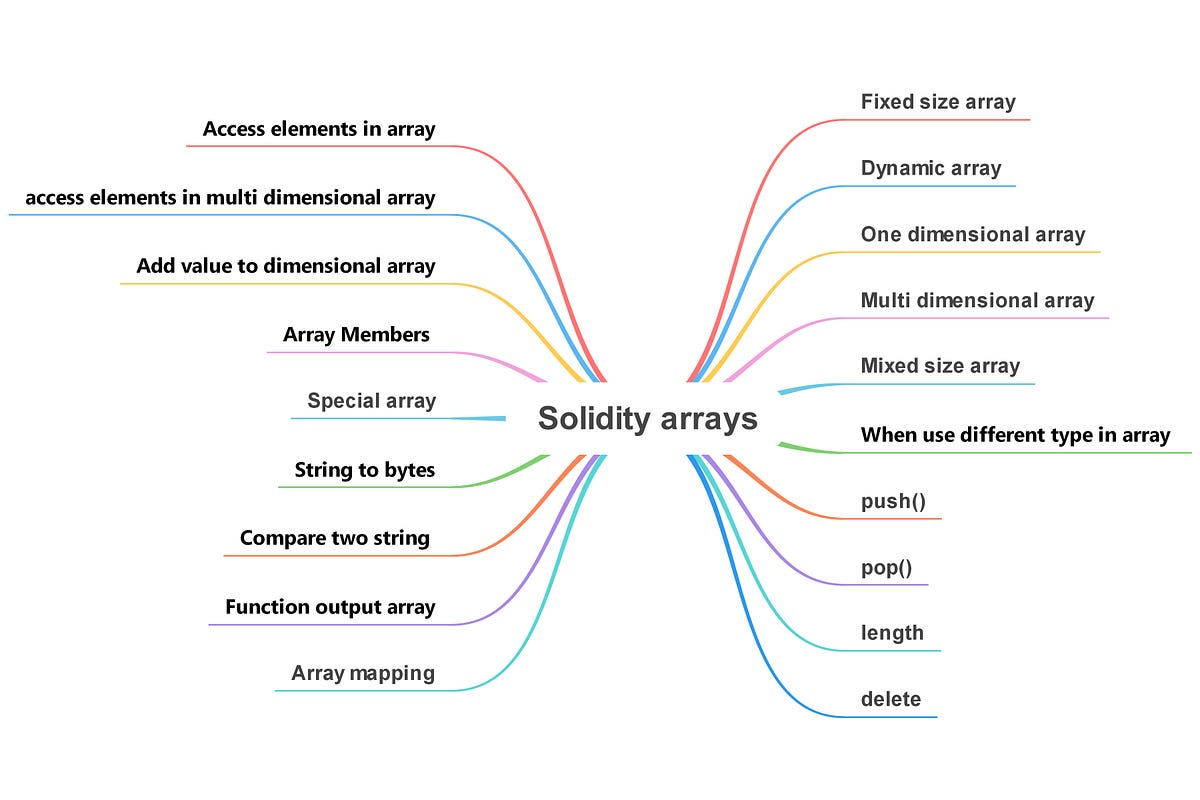Solidity String Arrays: A Comprehensive Guide
Learn how to use string arrays in Solidity to store and manipulate collections of text data within your smart contracts.
Learn how to use string arrays in Solidity to store and manipulate collections of text data within your smart contracts.
Solidity, unlike some other programming languages, handles dynamic string arrays differently. You can't simply declare a dynamic string array and start adding elements to it. This might seem limiting, but it's due to how Solidity manages strings and memory for efficiency.
Solidity doesn't directly support dynamic string arrays like you might be used to in other languages. You can't declare them like string[] myArray; and expect to add strings dynamically.
Here's why and how to work around it:
Strings are complex: In Solidity, strings are essentially dynamic byte arrays under the hood. This makes storing them in an array directly inefficient.
Fixed-size arrays are possible: You can use fixed-size string arrays if you know the size beforehand:
string[5] public names; // Array can hold exactly 5 strings
names[0] = "Alice"; Dynamic arrays for other types: You can have dynamic arrays of other types, like uint256:
uint256[] public numbers;
numbers.push(10); Workarounds for dynamic string arrays:
Bytes array with manual management: Store strings in a dynamic bytes array and manage string lengths yourself. This is efficient but less user-friendly.
Structs for key-value pairs: If you need to associate strings with keys (like a dictionary), use structs:
struct User {
address id;
string name;
}
User[] public users;ABIEncoderV2 (with caution): Since Solidity 0.7.5, ABIEncoderV2 allows encoding complex types, including string arrays, for external function calls. However, use it carefully due to potential gas cost implications.
pragma solidity ^0.8.0;
pragma experimental ABIEncoderV2;
function getNames() public view returns (string[] memory) {
string[] memory names = ["Alice", "Bob"];
return names;
}Choosing the right approach:
The best solution depends on your specific use case. Consider:
This Solidity code presents various methods for working with dynamic string arrays, a feature not directly supported in Solidity. It showcases using fixed-size arrays when the size is predetermined, employing dynamic byte arrays for manual string storage and retrieval, leveraging structs to associate strings with other data types, and utilizing ABIEncoderV2 for returning dynamic string arrays from external functions. Each approach comes with its own trade-offs in terms of gas efficiency, code complexity, and data mutability, allowing developers to choose the most suitable method based on their specific requirements.
This code demonstrates the different ways to handle dynamic string arrays in Solidity.
pragma solidity ^0.8.0;
pragma experimental ABIEncoderV2;
contract DynamicStrings {
// 1. Fixed-size string array (known size)
string[3] public fixedNames = ["Alice", "Bob", "Charlie"];
// 2. Dynamic array for other types (uint256)
uint256[] public numbers;
// 3. Bytes array with manual management
bytes[] public byteStrings;
function addByteString(string memory newString) public {
byteStrings.push(bytes(newString));
}
function getByteString(uint256 index) public view returns (string memory) {
return string(byteStrings[index]);
}
// 4. Structs for key-value pairs
struct User {
address id;
string name;
}
User[] public users;
function addUser(address _id, string memory _name) public {
users.push(User(_id, _name));
}
// 5. ABIEncoderV2 (for external function calls)
function getNames() public view returns (string[] memory) {
string[] memory names = ["David", "Eve", "Frank"];
return names;
}
}Explanation:
fixedNames: This demonstrates a fixed-size string array where the size is known beforehand.numbers: This shows a dynamic array for uint256 type, highlighting that dynamic arrays are possible for other types.byteStrings: This uses a dynamic bytes array to store strings. addByteString converts a string to bytes and pushes it to the array. getByteString retrieves the bytes at a given index and converts them back to a string.users: This uses a struct User to store an address and a string together. The users array can then hold multiple User structs, effectively associating strings with addresses.getNames: This function uses ABIEncoderV2 to return a dynamically sized string array. This approach is suitable for external function calls but should be used cautiously due to potential gas cost implications.This example provides a practical understanding of the different approaches to handling dynamic string arrays in Solidity. Remember to choose the method that best suits your specific needs, considering factors like data mutability, gas efficiency, and code readability.
Memory Management: The reason behind Solidity's handling of strings and their lack of direct support for dynamic string arrays stems from how it manages memory. Solidity differentiates between storage (persistent data on the blockchain) and memory (temporary data during function execution). Strings, being dynamically sized, are more complex to manage in storage, especially when placed in arrays that can grow unpredictably.
Gas Cost Implications: Each operation on the blockchain, including manipulating data structures like arrays, consumes gas. Dynamically sized data structures can lead to unpredictable gas costs, especially for operations like resizing arrays. Solidity's design choices around strings and arrays are intended to make gas costs more predictable.
Alternative Approaches: While the provided workarounds are common, other approaches exist:
Solidity Version Considerations: Always be mindful of the Solidity version you're using. Features like ABIEncoderV2 were introduced in later versions and might not be available in older versions.
Security Implications: When working with dynamic data structures, especially when using low-level manipulation like with byte arrays, be extra cautious about potential vulnerabilities like buffer overflows. Always thoroughly test your code.
Best Practices:
Solidity doesn't have direct support for dynamic string arrays due to the complex nature of strings (dynamic byte arrays).
Here's a breakdown of your options:
If you know the array size in advance:
string[5] public names;
For dynamic string storage:
bytes array.Choosing the best approach depends on:
Solidity handles dynamic string arrays differently due to its focus on efficiency and predictable gas costs. While you can't directly declare and use them like in other languages, workarounds exist. If you know the array size beforehand, fixed-size arrays are suitable. For dynamic scenarios, consider byte arrays for manual management, structs for organized key-value storage, or ABIEncoderV2 for external function calls (with caution due to potential gas costs). The best approach depends on your specific needs, considering data mutability, gas efficiency, and code readability. Remember to prioritize secure coding practices and thorough testing, especially when dealing with dynamic data structures in Solidity.
 What are string arrays in Solidity? | Contributor: Maham Basit
What are string arrays in Solidity? | Contributor: Maham Basit How to Create String Arrays in Solidity? - | Become a better web3 developer by reading articles and curated content around web3, blockchain, solidity, rust and more.
How to Create String Arrays in Solidity? - | Become a better web3 developer by reading articles and curated content around web3, blockchain, solidity, rust and more. String array as parameter input in public function - Ethereum Smart ... | Hey, my good friend @dan-i, I need some expert advice! 🤓 I’m having some trouble using string[] as an input parameter to a public function, I got tips from @rph in the Moralis Discord channel to use https://ethereum.stackexchange.com/a/1623, but I don’t understand how to use this, and I cannot find any good examples on how to use it. I’ve tried to create a function that takes in a string and divides it by commas. but there is something wrong with my code, and I can’t figure out where...
String array as parameter input in public function - Ethereum Smart ... | Hey, my good friend @dan-i, I need some expert advice! 🤓 I’m having some trouble using string[] as an input parameter to a public function, I got tips from @rph in the Moralis Discord channel to use https://ethereum.stackexchange.com/a/1623, but I don’t understand how to use this, and I cannot find any good examples on how to use it. I’ve tried to create a function that takes in a string and divides it by commas. but there is something wrong with my code, and I can’t figure out where... Permit fixed size arrays to be supplied for params and return values ... | I’d propose that the language permit functions to both accept and return arrays of fixed size via parameters characterized as dynamic. At present, for example if the function signature is function getKeys() public pure returns(string[] memory) A return value of return ["key1", "key2"]; won’t compile due a type error (string[2] not compatible with string[]), which is both surprising and extremely inconvenient making it very difficult for example to use library functions which will work on ar...
Permit fixed size arrays to be supplied for params and return values ... | I’d propose that the language permit functions to both accept and return arrays of fixed size via parameters characterized as dynamic. At present, for example if the function signature is function getKeys() public pure returns(string[] memory) A return value of return ["key1", "key2"]; won’t compile due a type error (string[2] not compatible with string[]), which is both surprising and extremely inconvenient making it very difficult for example to use library functions which will work on ar... Types — Solidity 0.8.29 documentation | Dynamic storage arrays and bytes (not string ) have a member function called pop() that you can use to remove an element from the end of the array. This also ...
Types — Solidity 0.8.29 documentation | Dynamic storage arrays and bytes (not string ) have a member function called pop() that you can use to remove an element from the end of the array. This also ... Arrays in solidity from zero to hero | by Mahmoud Mourad Dev ... | Arrays
Arrays in solidity from zero to hero | by Mahmoud Mourad Dev ... | Arrays return array in solidity · GitHub | GitHub Gist: instantly share code, notes, and snippets.
return array in solidity · GitHub | GitHub Gist: instantly share code, notes, and snippets.